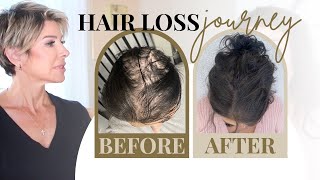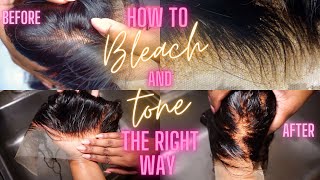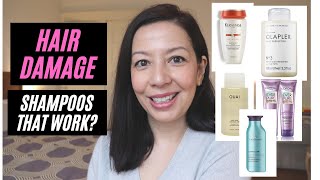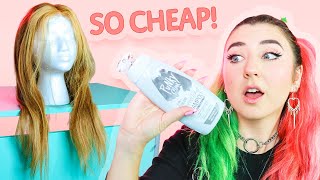How Well Do You Know Your Shampoos?
 How well do you know your shampoo? Do You know what it does, and the types that are out there? Yes, I am asking because as we delve into the mechanics of our hair, all the way down to the cellular level we may have forgotten just how important it is to know the products we are using and what they can do for us.
How well do you know your shampoo? Do You know what it does, and the types that are out there? Yes, I am asking because as we delve into the mechanics of our hair, all the way down to the cellular level we may have forgotten just how important it is to know the products we are using and what they can do for us.
As many of us begin to fall out of love with shampoos, there are still tons more who use them faithfully. Shampoos often take a backseat to conditioners and styling products and I can understand why.
Cleaning is such a basic need that it often gets overlooked in the hair-care game. More of us are concerned with rocking those curls, coils and kinks to sheer perfection but if you start off wrong (with the wrong cleanser) you are doing your hair and health no favors.
So, let’s back up and start off with the basics. Let’s learn about shampoo and the several types on the market. I guarantee you that you will walk away learning something new as we have some of the old, the new and the totally revamped.
What is shampoo?
In a nutshell, shampoos are cleaning formulations made up primarily of surfactants that have the ability to surround oily materials on surfaces and allow them to be rinsed away by water.
Shampoos cleanse your hair of dirt, pollutants, sweat, and product build-up. They are essential in healthy hair care as healthy hair is clean hair. I cannot say that enough! Dirty hair does not grow faster than clean hair and dirty hair can actually impede your hair’s growth.
Now, I know that many (including myself) have sworn off shampoos. Many naturals have adapted to cowashing or cleansing hair with a botanical or cleansing conditioner in place of shampoo.
There are even some women out there cleansing with water only. Personally I am not a fan or advocate but it exists and is therefore worth mentioning.
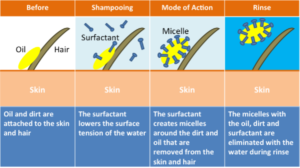 How do they work?
How do they work?
There is real science behind what a shampoo can do. They lower the surface tension of the water, making it less likely to stick to itself and able to bind with oils* and soiling particles.
Part of a detergent molecule is hydrophobic and the hydrocarbon portion of the molecule binds to the sebum coating hair, as well as to any oily styling products or what we call product build-up.
The surfacants or detergents in shampoos have a hydrophilic component so when you rinse your hair, the detergent is swept away by the water, carrying all the dirt, sebum, sweat, pollutants and product build-up away with it.
Why do we need shampoo?
The bottom line is shampoo is still an essential component of healthy hair care. You may use it sparingly, water it down, or use it every single time you wash your hair but removing it completely from your regimen may not be the best thing to do.
Sometimes we need to clarify if we have a ton of build-up, or you may have prolonged your washday or if you are working out more and want to ensure you are removing all the dirt, sweat and gunk. Whatever the reason, hitting the shampoo bottle every now and again cannot hurt even if you hate it. Try a sulfate-free one, water your’s down or do a pre-poo to help it from stripping your hair.
Look, I hate shampoo with a passion because it creates tangles and removes all the oils* my hair need and love. But I also hate working out but know it is necessary to stay healthy and become fit. Sometimes you gotta suck it up and do what is best for yourself because in the long run it is necessary.
What different types of shampoos can we use?
It is no secret that naturals have changed the hair care market with our needs and honestly, it’s about time! We matter and our needs are being met because our dollars are at work and being (finally) valued by manufacturers.
I truly believe that is why we are hearing about and seeing more variations of cleansers on the market for our tresses. Shampoos are not so one dimensional anymore and knowing what types there are and how they need to be used are essential in getting just the right product for your hair’s needs.
There are regular, everyday liquid shampoos that most people use but did you know there were others that have meet specific needs? Here is a list of them.
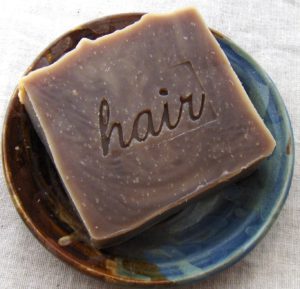 Clarifying Shampoo*
Clarifying Shampoo*
These shampoos are considered purifiers, detoxers and even deep cleaning shampoos. They are designed to remove stubborn build-up from your hair like silicones, waxes, moisturizers or anything that is just weighing down your tresses and leaving a dull film to your hair.
They do help in lifting away mineral deposits from hard water but not as effectively as a Chelating shampoo* (further down the list) as their primary job is to remove gunk from your hair.
They tend to be harsher than regular shampoos because they are working harder than a regular shampoo that will have gentler formulations.
Clarifying shampoos contain fewer conditioning agents, and more surfactants, in order to clean the hair as thoroughly as possible so conditioning after is a MUST and deep conditioning* is a no-brainer as well.
Shampoo Bars
Most shampoos are in liquid form but a shampoo bar* is a solid. Shampoo bars are an all natural conditioning shampoo in a solid bar form and usually made from all natural ingredients.
They are usually chock-full with natural oils* and they gently cleanse without drying out or harming the hair. They are great for traveling, no waste associated with them and they tend to last much longer than a liquid shampoo.
Sulfate-free Shampoos
Sulfates like Sodium Lauryl Sulfate (SLS) are cheap yet rather powerful, grease cutting detergent that also aids in the foaming nature of soap.
The problem with sulfates like SLS is that they can irritate the skin (scalp) and are extremely drying to naturals. A sulfate-shampoo is just using alternative ingredients to get the job done or cleanse the hair.
They are just as effective as sulfate shampoos without the hassle and problems of sulfates. Sulfate-shampoos are the win/win for many naturals who love shampoo but hate the drying effects it can give to their tresses.
Chelating Shampoo*
These shampoos do not get much press and actually I only heard about them a few weeks ago! If you have hard water you either have already heard of chelating shampoos or if not then you need to take heed.
Hard water is usually defined as water which contains a high concentration of calcium and magnesium* ions. They have high concentrations of minerals in the water and all that is being deposited and negatively affecting your hair.
They are hard to remove and regular shampoos cannot do the job and even some clarifying shampoos cannot. Chelating shampoos are specifically formulated to bind with metals and minerals and remove them from the hair.
Chelating agents are useful for removing the metals in hard water and minerals/chemicals of chlorine water. Chelating products typically contain EDTA or Ethylenediaminetetraacetic acid.
As you would ave guessed, these are powerhouse shampoos that will leave your hair drier and thirstier than before you used them.
You MUST condition and deep condition after their use and they should not be your only shampoo. Too much use and you will be harming your hair.

